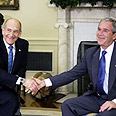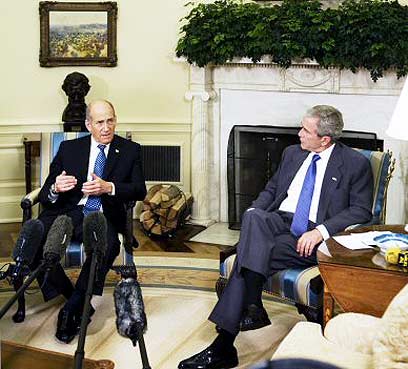
'New PA situation makes two-state solution possible'
Olmert, Bush meet in private, discuss ongoing strife in Palestinian Authority. Olmert says Israel willing to work towards two-state solution. IDF to stay out of Gaza. Israel likely to intervene if situation deteriorates. Also on Olmert's Washington agenda: Iran, Syria and Jonathan Pollard
WASHINGTON - Prime Minister Ehud Olmert was upbeat Tuesday evening after a lengthy three-hour meeting with US President George W. Bush in the White House.
The two shared lunch and discussed the newfound situation in the Palestinian Authority.
"We have an opportunity to seize the situation and work toward the establishment of a Palestinian state and fulfill the president's vision of two states for two people," said Olmert.
Speaking with reporters after the meeting, Olmert said he and the president had discussed the difficulties presented by the new situation in Gaza and the need to establish stable Palestinian rule amidst the uncertainty through the new government led by Salam Fayyad - a government that would be free of Hamas.
"We need to strengthen the security forces (of Abbas) and our cooperation with them, those are base requirements for the establishment of a Palestinian state. Talks with (Palestinian President) Mahmoud Abbas will continue," said Olmert at the briefing.
Olmert said that next Sunday the government would discuss unfreezing taxes collected by Israel for the Palestinian Authority. The move however, would require ensuring that the funds, frozen since Hamas came to power, reached the citizens. Likewise, Israel has not ruled out possibly aiding Abbas' military power.

Olmert and Bush on Tuesday (Photo: AFP)
Bush and Olmert meet in private and the prime minister said that he felt the two countries saw eye-to-eye on most issues. "The events that took place in Gaza did not surprise Israel. In contrast to the optimism voiced by certain Arab nations, Israel warned that the situation was dangerous," said Olmert.
"But the result of these events has been a positive one. The unity government was dismantled and a government free of Hamas was formed, a government Israel is very interested in cooperating with," he said.
Olmert rejected any suggestion of talks with Hamas: "Any contact with Hamas is out of the question. Hamas is wholly committed to violently attacking Israel and does not recognize Israel. They are willing to murder Palestinians without any regard, to throw people off buildings to their deaths, to shoot defenseless people in their kneecaps and render them handicapped for life.
"Hamas has brought this on itself. It has only reinforced our opinion, and that of the world about Hamas; there are some in the Palestinian world who we cannot talk to."
Israel has been monitoring the situation in the PA very closely but so far has not intervened. "The situation may deteriorate into a massacre of civilians, including Fatah operatives. If this happens, I assume that Israel will not stand by and say 'it's none of our business,'" said Olmert, "even if we're not involved in it. We will have to see what courses of action we can take. If these things happen – we will have to provide the correct response to them."
'Those who thought Hamas could compromise proven wrong'
Olmert added that Israel hopes that by working to strengthen the Palestinian government, the two-state solution will become a possibility. Israel expects more strife in Gaza, but at this point Olmert refused to say what he might do if the muzzles start pointing towards Israel.
Either way, said Olmert, Hamas' takeover of Gaza is in a way a fulfillment of its potential: "Hamas' unbearable brutality helped showcase the radicalism of these elements.
"There were those who thought it was possible to reach a compromise - that illusion has been scrapped. But this opens a window of opportunity to other processes we want to pursue."
On the Iranian threat Olmert said that the president was determined to continue the current efforts, including imposing the diplomatic and economic sanctions that have already been decided upon, as well as others that have not yet been approved.
Olmert said he left the meeting feeling "much calmer than the last time regarding the efforts being made to block Iran."
Shortly before the meeting, Bush and Olmert held a joint press conference. Bush addressed the situation with Syria and said that relations between Israel and Syria were Olmert's "business" and that Israel does not need American approval for peace talks.
Olmert also dismissed the allegations that the US was holding Israel back from negotiations with Syria: ''The United States never came to us with a demand not to have negotiations with the Syrians, and we never thought to ask permission,'' he said, adding that if the situation develops and allows for negotiations – negotiations will be held.
Olmert said he doubted the lack of negotiations would lead to immediate conflict with Syria. ''I believe that a war will not break out. We are not interested in it and I believe the Syrians are not interested in it. Certain statements can sometimes lead to miscalculations and we need to be wary of that," he said.
Olmert also confirmed that during his visit to the US he discussed the matter of Jonathan Pollard's imprisonment.










